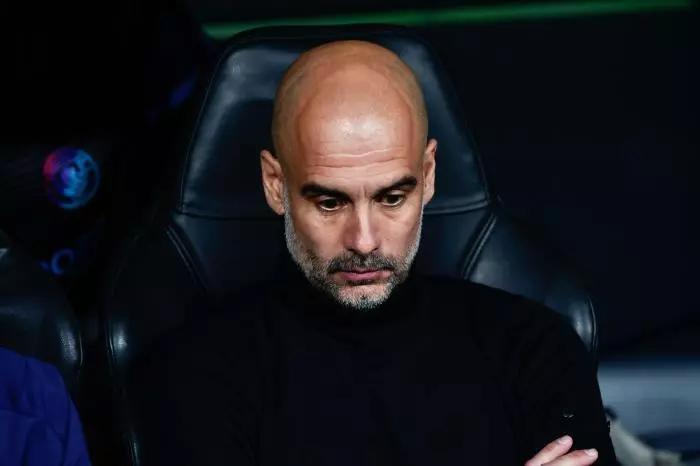Pep Guardiola's Yaya Toure 'curse' and nine other spooky hexes of football folklore

Are curses in football real? Pep Guardiola probably doesn't think so, but you never know...
After Manchester City lost their Champions League semi-final to Real Madrid, stories resurfaced about a supposed curse placed on Pep Guardiola stemming from a feud with Yaya Toure.
In reality, their European exit was more down to poor defending and tactical inflexibility than anything supernatural, although football is full of strange tales of curses and hexes. Some even coincide with spooky changes of fortune.
So whether you are a believer or not, the following examples may just make you think.
Racing Club cat curse
Remarkably, seemingly in an instant, success turned to a trophy drought that lasted decades. Racing Club started taking it so seriously that they performed an exorcism, but that didn't help. They then resorted to excavating their own pitch, but were only able to find and remove six of the cats.
Hibernian and the harp
Hibernian won the Scottish Cup for the first time in 2016, beating Rangers to finally end a 114-year wait to win the trophy. Was there more to it than there seemed, though?
This upset a local woman, who 'cursed' the club until they put the harp-emblazoned crest back in what she considered its rightful place.
The club finally complied in - you guessed it - 2016, just months before they won the Scottish Cup.
Benfica and the curse of Bela Guttmann
While Benfica command a lot of respect, they are also a club who the European elite are secretly quite happy to be drawn against.
Real Madrid dominated the European Cup in the 1950s, winning five successive titles. Benfica were the team who ended that run, enjoying back-to-back successes to start the '60s as Europe's top team.
Bela Guttman was the coach who delivered that and, perhaps understandably, asked the club for a pay rise. The board refused and Guttmann cursed the club with words that have plagued them ever since: "Not in a hundred years from now will Benfica ever be European champion."
Even building a statue of Guttmann at the Estadio da Luz didn't help, nor did Eusebio literally praying to it before the 1990 European Cup final.
Leeds' Elland Road curse
Don Revie was, as most people know, meticulously superstitious. He could not entertain wearing anything to a game besides his lucky suit, or taking a different route to the dugout.
In fact, he was so convinced bird imagery was a bad omen that he made the club remove the peacock from the Leeds United crest.
Don't touch the cup!
Whether it's an actual curse or not, it's probably best to play it safe. Hands by your sides.
America De Cali and the curse of Garabato
One man was not happy about it, though, a gentleman and former player by the name of Benjamin Urrea and known as El Garabato. He argued bitterly against the move, but was ultimately unable to convince anyone to follow him.
Eventually, defeated and furious, Urrea stormed out of the meeting with the parting words: "They can do whatever they want with the team, but I swear to God they will never be champions."
Hammerfest and the curse of Nils Mikkel Sara
Sara demanded an apology and when it didn't materialise, he placed a 'gande' (a term used for Sami curses) that Hammerfest would lose all their remaining games and be relegated.
"At first the Hammerfest coach assumed they were just unlucky, but then the players started to believe in the curse," an expert on the story told the Guardian. "After talking to some old locals, the coach tried lifting the curse by sacrificing herring at a sacrificial stone in the area, but it didn't help."
Barry Fry's desperate measures at Birmingham
Barry Fry, ever the innovator, had a different solution. During a long run of games without a win, he urinated in all four corners of the ground in an attempt to lift the curse. "We were desperate, so I p***ed in all four corners, holding it in while I waddled round the pitch," he recalled.
Derby and the curse of the Baseball Ground
Another club who fell foul of Romany Gypsies were Derby. They moved to the Baseball Ground in 1895, evicting the former residents to do it.
It took them 42 years to get back to an FA Cup final and then-manager Jack Nicholson paid Gypsies to remove the curse. With the scores level after 90 minutes against Charlton, the ball burst, which many took to be symbolic of the curse being broken. They went on to win 4-1.
Pep Guardiola Champions League curse
"He [Guardiola] turned all Africa against himself, many African fans turned away from Manchester City," said Yaya Toure's agent Dimtry Seluk in 2018 when discussing the Spaniard's decision to bench the player for his final year at Manchester City.
You have to wonder whether those words have gone through Guardiola's mind following Real Madrid's astonishing comeback against Man City in the Champions League semi-final.
How much of that is down to a 'curse' is questionable, of course. All but two of those semi-final defeats came before he even arrived at the Etihad, although he has also lost a final with the Citizens too.




